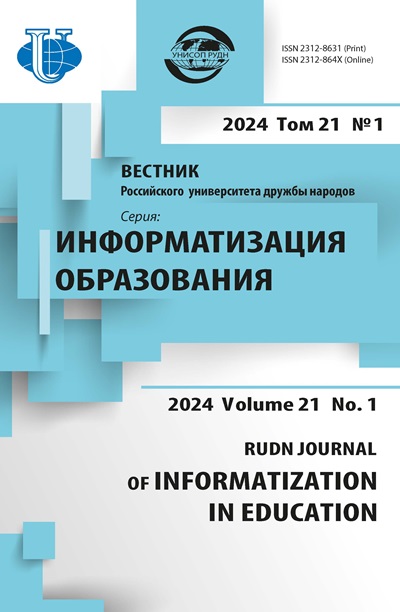Issue
Title
Authors
|
Aslanov R.E., Shunina L.A., Grinshkun A.V., Bolshakov A.A. |
|
Zenkina S.V., Gerasimova E.K., Fedoseeva M.V. |
|
Shunina L.A., Grinshkun A.V. |
|
Dobromirov D.D., Wu R. |
|
Kapterev A.I., Romashkova O.N., Chiskidov S.V., Ermakova T.N. |
|
Nikulina E.G., Kibishev A.N., Gribkov D.N. |
|
Kitikar O.V. |
|
Kornilov V.S. |
|
Anikanova K.I. |
|
Salekhova L.L., Grigorieva K.S. |
|
Guseva A.I., Kireev V.S. |
|
Drobysheva I.V., Drobyshev Y.A. |
|
Zaslavskaya O.Y., Levchenko M.S. |
|
Kornilov V.S. |
|
Kartashova L.I., Levchenko I.V., Pavlova A.E. |
|
Kudinov V.A. |
|
Glizburg V.I. |
|
Zaslavskaya O.Y., Puchkova E.S. |
|
Kartashova L.I., Levchenko I.V., Pavlova A.E. |
|
Grinshkun V.V., Shunina L.A. |
|
Grigoriev S.G., Grinshkun V.V., Levchenko I.V., Zaslavsky O.Y. |
|
Levchenko I.V. |
|
Kartashova L.I., Levchenko I.V., Pavlova A.E. |
|
Dobritsa V.P., Ivanova T.V. |
|
Azevich A.I. |
|
Abdraimov D.I. |
|
Beloglazov A.A., Beloglazova L.B., Malkov I.M., Antonova N.A., Alekseeva L.A., Kopylova P.A., Novoselova N.V., Pudovkina S.D., Beloglazova I.A. |
|
Kornilov V.S. |
|
Ofitserov V.P., Ofitserov M.V., Bocharova O.A. |
|
Kartashova L.I., Levchenko I.V. |
|
Kartashova L.I., Levchenko I.V., Pavlova A.E. |
|
Sadykova A.R., Levchenko I.V., Kartashova L.I. |
|
Azevich A.I. |
|
Khudolei N.V. |
|
Gerbekov H.A., Halkecheva I.T. |
|
Senashenko D.V., Senashenko M.D. |
|
Grigoriev S.G., Esayan A.R. |
|
Romashkova О.N., Ermakova Т.N. |
|
Gracheva O.A., Matukhin P.G., Elsgolts S.L. |
|
Karyakin M.I., Sokolova M.A., Khatlamadzhian P.A., Shutko V.M. |
|
Kornilov V.S. |
|
Grinshkun V.V., Salikhov S.V. |
|
Grigoryeva K.S., Salekhova L.L. |
|
Kornilov V.S., Berkimbayev K.M., Saparbekova G.A. |
|
Puchkova E.S. |
|
Philippov S.A., Komelina E.V. |
|
Kornilov V.S. |
|
Shkarban F.V. |
|
Krasnova G.A., Nuhuly A., Teslenko V.A. |
|
Medzhidova A.A. |
|
Pavlova A.E. |
|
Grigoriev S.G., Sumatokhin S.V. |
|
Yakurnova A.V. |
|
Kalmykova O.V. |
|
Yamschikova N.A. |
|
Levchenko I.V., Kartashova L.I. |
|
Kostikov A.N., Kuznetsova I.V. |
|
Ramankulov S.J., Kornilov V.S., Berkimbaev K.M., Sarybayeva A.K. |
|
Zaslavskaya O.Y., Filatova N.I. |
|
Komelina E.V., Gusakova T.M. |
|
Kornilov V.S., Lvova O.V., Obolensky I.S. |
|
Beloglazov A.A., Beloglazova L.B., Beloglazova I.A. |
|
Kornilov V.S. |
|
Abdurazakov M.M., Nimatulaev M.M., Tsvetkova O.N. |
|
Bondareva O.V., Beloglazova L.B. |
|
Govorov A.I., Govorova M.M., Shikov A.N. |
|
Grinshkun V.V., Dimov E.D. |
|
Kornilov V.S., Berkimbayev K.M., Ernazarova D.Z. |
|
Remorenko I.M. |
|
Belyaev M.I. |
|
Zaslavskaya O.Y. |
|
Grigoryev S.G., Denishcheva L.O. |
|
Golovenko A.V. |
|
Bratchikov I.L. |
|
Garcia A.C., Silva M.C. |
|
Kusakina E.V., Samarina E.A., Frolov Y.V. |
|
Zaslavskaya O.Y., Kornilov V.S. |
|
Bekbulatova I.U., Berkimbaev K.M., Meyrbekova G.P. |
|
Abramov A.G., Bulakina M.B., Ivannikov A.D., Krivosheev A.O., Shmelkova L.V. |
|
Dimov E.D. |
|
Kornilov V.S. |
|
Galeeva N.L., Zaslavskaya O.Y. |
|
Shihaleva L.A. |
|
Mukhamedzhanov B.K., Berkimbaev K.M., Abuseitov B.Z., Omarov B.S. |
|
Grinshkun V.V., Levchenko I.V. |
|
Nimatulaev M.M., Magomedov R.M. |
|
Khudzhina M.V. |
|
Asaulenko E.V. |
|
Galchuk L.M. |
|
Tasova A.B., Niyazova G.Z., Berkimbayev K.M., Pralieva R.E. |
|
Beloglazov A.A., Beloglazova L.B., Bondareva O.B., Ismailova H.E. |
|
Egorova M.A. |
|
Kornilov V.S. |
|
Sadovnichy U.V., Turkmenov R.M. |
|
Kornilov V.S. |
|
Sivokon E.E. |
|
Tsyganov V.I. |
|
Bocharov M.I. |
|
Grinshkun V.V., Berkimbaev K.M., Mukhamedzhanov B.K., Abusseitov B.Z., Omarov B.S. |
|
Dmitriev V.M., Dmitriev I.V. |












